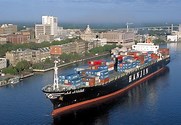
ATLANTA – The Georgia Ports Authority set a tonnage record during the last fiscal year despite the economic impact of the coronavirus pandemic.
For fiscal 2020, which ended last month, the ports of Savannah and Brunswick handled an all-time high 37.77 million tons of cargo, up 233,000 tons – or 0.6% – compared to fiscal 2019.
The record came despite a slight downturn in the number of twenty-foot equivalent container units that moved through the Port of Savannah, a decrease driven by the global pandemic that began taking a toll on commercial shipping in March.
“Cargo volume reductions related to COVID-19 were offset by the strength of our export markets and record volumes earlier in the year,” Griff Lynch, the ports authority’s executive director, said Monday.
Meanwhile, growth continues in and around the Port of Savannah.
The first nine of 18 tracks at the $126.7 million Mason Mega Rail project are now moving cargo at the port. When complete, the project will increase Georgia’s reach to a mid-American arc of cities, including Chicago, St. Louis and Columbus, Ohio.
Also, two new mobile harbor cranes have been added to Savannah’s Ocean Terminal, and a new container yard will be completed at Ocean Terminal by the end of the year.
Twenty new rubber-tired gantry cranes are due to arrive in Savannah by December, and three new rail-mounted gantry cranes are scheduled to go into service by the end of the current fiscal year next summer.
Just outside of the port, 5 million square feet of industrial space are currently under construction. The latest announcement came from Port City Logistics, which is investing $80 million in a 1.1 million square-foot warehouse.
“What sets Savannah apart from the competition is the sheer capacity of the port’s ever-expanding footprint, on and off the terminal,” said Will McKnight, the authority’s board chairman. “Not only are we focused on the future and providing even greater value to our customers, but we have nearly unlimited potential and capacity to grow our business.”
On the other side of the state, the Appalachian Regional Port (ARP) near Chatsworth handled more than three and a half times the cargo in fiscal 2020 as the year before, moving 27,132 containers by rail. The inland rail terminal, which opened nearly two years ago, allows the authority to reduce truck traffic on Georgia’s highways by diverting cargo to rail.
“As more customers learn the value the ARP brings to their operations, the facility continues to gain traction and build momentum,” Lynch said. “We forecast business there to continue growing.”